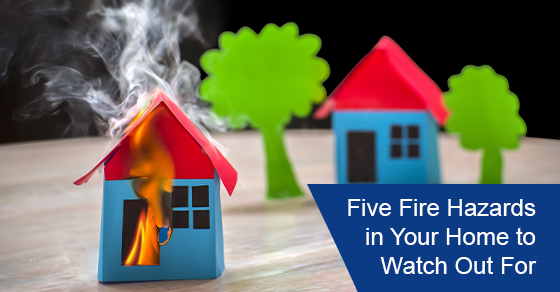
Five Fire Hazards in Your Home to Watch Out For
Posted by on Dec 30, 2020 in
One of the biggest reasons people in Ottawa buy home insurance is to ensure that they are protected from a fire. It’s everyone’s worst nightmare to have their home burn down, putting their loved ones at risk, and losing prized possessions and family heirlooms. Besides living in your home, you may be working in it as well, and your kids may be doing online learning in their rooms. The last thing you want in uncertain times is to have to relocate because of a fire. The good news is there are many ways to reduce the risk of fire hazards in your home. These are some of the top fire hazards in your home to watch out for:
- Cooking
- Smoking
- Candles and fireplaces
- Wiring and electrical outlets Dryers
Cooking
Unattended cooking is the number one cause of house fires. The old saying is that “A watched pot never boils,” but an unwatched one can set your house on fire. Here are ways you can help reduce the risk of cooking fires in your home:- Never fill pots or pans to the brim, especially if you are cooking with oil.
- Keep your stovetop clean to avoid grease build-up.
- If you must step away from your cooking, set a timer, so you don’t forget about what’s on the stove.
Smoking
Another one of the leading causes of house fires is smoking, particularly in the bedroom where you could fall asleep with a lit cigarette. If you do smoke or have guests that smoke, try to smoke outside only. Make sure that your butts are properly extinguished and never throw them somewhere they could catch an area on fire, such as your grass or your garden. If you have young children, make sure that matches or lighters are not within their reach. While an e-cigarette doesn’t have a flame like traditional cigarettes, it can still cause a fire if the battery explodes. Always keep an eye on it while it’s charging.Candles and Fireplaces
Nothing says a cozy winter evening like a roaring fire with some candles burning by it. While this looks beautiful, it can be a fire hazard if not taken care of properly. You should have your chimney cleaned and inspected once a year (usually before winter) to make sure it’s in good shape. If you choose to light a fire or have candles going, make sure that nothing flammable is near them. Ensure that there’s enough space so that nothing will accidentally be blown into the flames if there’s a sudden draft. If you love the look and warmth of a fire, you can always have a gas fireplace installed. There are also artificial candles that give a lovely glow with none of the fire concerns.Wiring and Electrical Outlets
There are several ways that you can end up with electrical fire hazards:Faulty wiring
Always have a qualified electrician upgrade or replace any wiring.Portable space heaters
Keep them away from anything flammable.Overloaded outlets
Don’t plug more items into an outlet than it can handle.Damaged or low-quality extension cords
Make sure that your cords have no wires exposed, which could spark and cause a fire.
Clothes Dryer
A clothes dryer makes your life easier. However, they can also be a source of house fires. Here are some tips to keep your dryer running well and decrease the risk of fire:- Before each load, empty the lint trap.
- Make sure nothing is obstructing the dryer vent.
- Every few months, vacuum the clothes dryer exhaust hose.
- Only have the dryer on if someone will be home.
Be Prepared in Case of A House Fire
Unfortunately, fires can start in your home despite all the precautions you take. To keep you safe, be prepared with the following:Smoke detectors
You must have working smoke detectors in your house on every level, especially outside your sleeping area. You should test your smoke alarms no less than once a month and change the batteries when Daylight Savings Time begins and ends.Fire extinguisher
Have a multi-purpose fire extinguisher on hand. Read the instructions on how to use it as soon as you get it. This way, you aren’t trying to learn how to use it when there’s a fire in your house.Evacuation plan
Have an evacuation plan. Make sure that everyone in your family knows how to get out of the house if there’s a fire and where you can safely meet up once you’ve evacuated.

